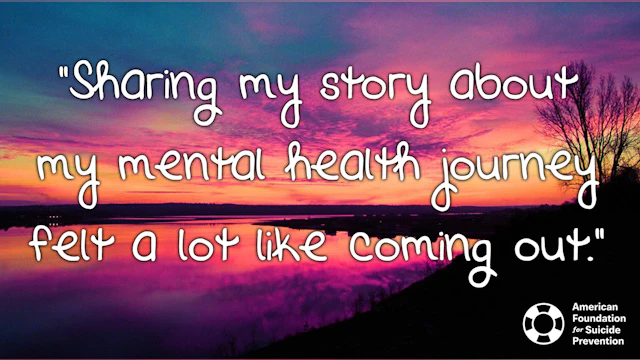This post is presented in collaboration with Active Minds, the national organization dedicated to empowering students to speak openly about mental health.
Jun. 26, 2018- For most of us, we wait some time before seeking mental health treatment. And even after we have been in treatment or even recovered, we don’t always share our experiences with others. Struggling with your mental health is something you’ve dealt with and known about for a long time, but it’s just not something you’ve discussed openly. It’s not like you walk into the room with a label on your forehead that reads “mentally ill.”
In the same way, when you’re part of the LGBTQ+ community you’ve typically known for a while how you identify, even if you didn’t always have the right words to describe your feelings. It’s something you know about yourself. And, similarly, we don’t walk into a room with the word “pansexual” or “non-binary” written on our foreheads. Having a mental illness and coming out have this in common—we’ve known about it for a long time but it hasn’t been something we talked about…until something prompts us.
As someone who is both living with a mental illness and identifies as a member of the LGBTQ+ community, I’ve accepted these things about myself. Once I was comfortable enough with these terms being attached to my personhood, I could come out of the closet—about my mental health and my sexual orientation. I had to first acknowledge and then accept that I experienced mental health difficulties. This didn’t happen until I had accurate language to describe my experiences. Likewise, I had to recognize and accept my sexuality. Though these may be things we’ve accepted about ourselves, others need time to understand.
Sharing my story about my mental health journey felt a lot like coming out. It was scary the first time and got easier each time I did it. There is a fear people won’t support you or will invalidate you. Invariably this will occur, but there are so many more who are supportive and understanding that the ones who are not fade away from memory. We hear people say “it’s all in your head,” “just snap out of it,” “just choose to be different,” or “I don’t believe that.” Others may want to be supportive but without knowing how, they overcompensate. They may say things like “I’ve been depressed, too” or “I have a gay friend” to put you at ease (even if it can be frustrating).
We spent a long time, maybe years, discovering ourselves and coming to terms with who we are and understanding what that meant—to ourselves, to those around us, to our future. We can’t expect those we confide in to understand immediately because we didn’t even understand ourselves immediately. Just as we had to adjust to our view of ourselves as mentally ill or LGBTQ+, they, too, need time. Their first reaction may not be what we had hoped for, but that doesn’t mean they won’t come to understand and turn into great sources of support. For other people, it’s a change in their perception of you.
Even though I may not be walking into a room with “queer” or “mentally ill” written across my forehead, I do enter with life experiences and a perspective informed by them. When I choose to be open about these components of myself, I invite you into my world and give you the opportunity to understand me. It’s important to remember that while these may be important pieces of who I am and have helped shape how I interact with the world around me, neither define me. I am more than my gender or sexuality. I am more than my mental illness.
